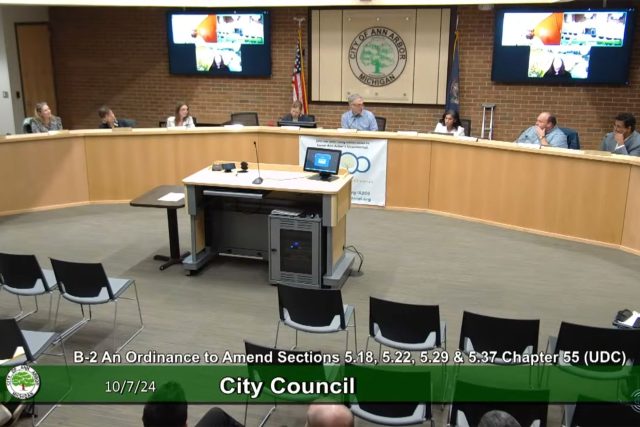[ad_1]
Ann Arbor City Council met at Larcom City Hall Monday evening to pass the “right to sit” ordinance, vote on how to spend money from a potential Washtenaw County millage and vote to accept a grant from the Michigan State Police for a community-based crisis response program. The council also listened to residents’ concerns about a request for a proposal for a phase two feasibility study into establishing a municipal power utility.
During the meeting’s public commentary portion, several speakers spoke in support of the Resolution for County Millage Rebate Use, a resolution detailing how Ann Arbor would spend a General Fund Rebate they would receive if a Washtenaw County millage is passed by voters on November 5. The resolution sets aside 40% of the rebate funds for an unarmed crisis response program in the city, 40% of the rebate for services that support residents of Ann Arbor Housing Commission properties and 20% for pedestrian and bicycle safety.
Aaron Cooper, executive director of Avalon Housing, praised the council for allocating money towards housing services.
“Dedicating 40% of the millage to supportive housing services is a hugely significant contribution to the well-being of the people living in our community,” Cooper said.
David Garcia, housing case manager at Ozone House, spoke in favor of the resolution’s decision to set aside funds for housing assistance, saying that housing needs go beyond just being placed in a physical home.
“Everyone deserves a home; however, getting housed is just one component,” Garcia said. “It is the team of community partners working together to help people develop the life skills to remain housed that is critical.”
Later at the meeting, Councilmember Cynthia Harrison, D-Ward 1, said she believed it was important that the resolution balanced funding for an unarmed public safety response team with support for individuals at risk of homelessness. She hoped this would address the disappointment expressed by community members following the council’s decision to reallocate funds initially allocated for an unarmed crisis response team.
“I understand the community’s frustration and disappointment, which is exactly why we are seeking a sustainable funding source that will enable us to meet these challenges long term, providing the financial stability we need to support both unarmed crisis response, and the supportive services that will assist with making unarmed crisis response more effective,” Harrison said. “This resolution is about making sure we have a safety net that supports mental health, public safety and long-term community stability in a way that is sustainable for years to come.”
The council unanimously approved the resolution.
Several residents also spoke during public commentary in support of the proposed right to sit ordinance, which would require that employers provide seating for their employees as long as it does not interfere with their ability to do their jobs. Social Work student Lexi Ried told the council about the benefits she observed of a right to sit ordinance in her hometown of St. Louis, Mo., and encouraged City Council to establish the ordinance in Ann Arbor.
“I moved to Ann Arbor about two months ago from St. Louis, Mo., where workers are afforded the right to sit,” Ried said. “As a worker who can spend anywhere from six to 15 hours a day on my feet, the right to sit has protected my physical and mental health. Being able to sit while on the clock did not negatively affect the impact of my work nor did it financially impact my employer.”
City Council unanimously approved the “right to sit” ordinance.
City Council also heard concerns from community members over the city’s recent request for proposal for firms to do a phase two feasibility study into the possibility of creating a municipal power utility in the city, which would replace DTE as a city-owned provider of electricity for Ann Arbor. Advocates for the creation of a municipal power utility say it would allow the city to convert to environmentally friendly sources of energy more quickly. The phase two feasibility study would estimate the cost of acquiring DTE infrastructure and becoming Ann Arbor’s electricity provider.
Brian Geiringer, executive director of Ann Arbor for Public Power, said that under the current RFP, the phase two feasibility study would lack needed legal analysis required to fully understand the cost of creating a municipal utility, leading to delays in its creation.
“Now is the moment to show our seriousness about these issues by ensuring that the second feasibility study on municipalization includes the necessary legal analysis so that this can be the last feasibility study before we initiate the municipalization process,” Geiringer said.
Councilmember Dharma Akmon, D-Ward 4, responded to concerns from A2P2 members, saying she did not see significant differences between the city’s RFP and suggestions A2P2 had made for improving the RFP.
“I really feel that the RFP was responsive to all of the public input that we got, including from (Ann Arbor for Public Power), and again as I read your marked-up version (of the RFP) versus what we have, I don’t see the gap,” Akmon said.
The council then discussed whether to approve a grant agreement with the Michigan State Police, which would provide money for a community-based crisis response program. Councilmember Travis Radina, D-Ward 3, said the city was careful to make sure they would be able to spend the money in ways they feel are best for the community.
“We had a lot of questions about it, because we wanted to make sure that it met our community’s values and that we were able to do with it what we see is appropriate in terms of community-based crisis response, rather than what the state police would want us to spend this money on,” Radina said.
The process of communication with state police and state Rep. Jason Morgan, D-An Arbor, took five months, according to Radina. City Council voted unanimously to approve the resolution.
Daily News Editor Abigail VanderMolen can be reached at vabigail@umich.edu.
Related articles
[ad_2]
Source link











